- Home
- Frank Herbert
The Jesus Incident Page 3
The Jesus Incident Read online
Page 3
So, he thought, it was the sun made that man black.
He was ten before he realized that the man who walked past was black from birth, from conception. Still, Morgan persisted in telling the other children in his crèche that it was the sun’s doing. He enjoyed the secret game of persuasion and deception.
Ah, the power of the game, even then!
Oakes straightened the cushion at his back. Why did he think of that black man, now? There had been one curious event, a simple thing that caused a commotion and fixed it in his memory.
He touched me.
Oakes could not recall being touched by anyone except his parents until that moment. On that very hot day, he sat outside on a step, cooled by the shade of the roof and the ventilator trained on his back from the doorway. The man walked by, as usual, then stopped and turned back. The boy watched him, curious, through the mesh fence, and the man studied him carefully, as though noticing him for the first time.
Oakes recalled the sudden jump of his heart, that feeling of a slingshot pulled back, back.
The man looked around, then up at the top of the fence, and the next thing Oakes knew the man was over the top, walking up to him. The black man stopped, reached out a hesitant hand and touched the boy’s cheek. Oakes also reached out, equally curious, and touched the black skin of the man’s arm.
“Haven’t you ever seen a little boy before?” he asked.
The black face widened into a smile, and he said, “Yes, but not a little boy like you.”
Then a sentry jumped on the man out of nowhere and took him away. Another sentry pulled the boy inside and called his father. He remembered that his father was angry. But best of all he remembered the look of wide-eyed wonder on the black man’s face, the man who never walked by again. Oakes felt special then, powerful, an object of deference. He had always been someone to reckon with.
Why do I remember that man?
It seemed as though he spent all of his private hours asking himself questions lately. Questions led to more questions, led ultimately, daily, to the one question that he refused to admit into his consciousness. Until now.
He voiced the question aloud to himself, tested it on his tongue like the long-awaited wine.
“What if the damned ship is God?”
Chapter 5
Human hybernation is to animal hibernation as animal hibernation is to constant wakefulness. In its reduction of life processes, hybernation approaches absolute stasis. It is nearer death than life.
—Dictionary of Science, 101st Edition
RAJA FLATTERY lay quietly in the hybernation cocoon while he fought to overcome his terrors.
Ship has me.
Moody waves confused his memories but he knew several things. He could almost project these things onto the ebon blackness which surrounded him.
I was Chaplain/Psychiatrist on the Voidship Earthling.
We were supposed to produce an artificial consciousness. Very dangerous, that.
And they had produced . . . something. That something was Ship, a being of seemingly infinite powers.
God or Satan?
Flattery did not know. But Ship had created a paradise planet for its cargo of clones and then had introduced a new concept: WorShip. It had demanded that the human clones decide how they would WorShip.
We failed in that, too.
Was it because they were clones, every one of them? They had certainly been expendable. They had known this from the first moments of their childhood awareness on Moonbase.
Again, fear swept through him.
I must be resolute, Flattery told himself. God or Satan, whatever this power may be, I’m helpless before it unless I remain resolute.
“As long as you believe yourself helpless, you remain helpless even though resolute,” Ship said.
“So You read my mind, too.”
“Read? That is hardly the word.”
Ship’s voice came from the darkness all around him. It conveyed a sense of remote concerns which Flattery could not fathom. Every time Ship spoke he felt himself reduced to a mote. He combed his way through a furry sense of subjugation, but every thought amplified this feeling of being caged and inadequate.
What could a mere human do against a power such as Ship?
There were questions in his mind, though, and he knew that Ship sometimes answered questions.
“How long have I been in hyb?”
“That length of time would be meaningless to you.”
“Try me.”
“I am trying you.”
“Tell me how long I’ve been in hyb.”
The words were barely out of his mouth before he felt panic at what he had done. You did not address God that way . . . or Satan.
“Why not, Raj?”
Ship’s voice had taken on an air of camaraderie, but so precise was the modulation his flesh tingled with it.
“Because . . . because . . .”
“Because of what I could do to you?”
“Yes.”
“Ahhhhh, Raj, when will you awaken?”
“I am awake.”
“No matter. You have been in hybernation for a very long time as you reckon time.”
“How long?” He felt that the answer was deeply important; he had to know.
“You must understand about replays, Raj. Earth has gone through its history for Me, replayed itself at My Command.”
“Replayed . . . the same way every time?”
“Most of the times.”
Flattery felt the inescapable truth of it and a cry was torn from him: “Why?”
“You would not understand.”
“All of that pain and . . .”
“And the joy, Raj. Never forget the joy.”
“But . . . replay?”
“The way you might replay a musical recording, Raj, or a holorecord of a classical drama. The way Moonbase replayed its Project Consciousness, getting a bit more out of it each time.”
“Why have You brought me out of hyb?”
“You are like a favorite instrument, Raj.”
“But Bickel . . .”
“Ohh, Bickel! Yes, he gave Me his genius. He was the black box out of which you achieved Me, but friendship requires more, Raj. You are My best friend.”
“I would’ve destroyed You, Ship.”
“How little you understand friendship.”
“So I’m . . . an instrument. Are You replaying me?”
“No Raj. No.” Such sadness in that terrible voice. “Instruments play.”
“Why should I permit You to play me?”
“Good! Very good, Raj!”
“Is that supposed to be an answer?”
“That was approval. You are, indeed, My best friend, My favorite instrument.”
“I’ll probably never understand that.”
“It’s partly because you enjoy the play.”
Flattery could not suppress it; a chuckle escaped him.
“Laughter suits you, Raj.”
Laughter? He remembered little laughter except the bitter amusement of self-accusation. But now he remembered going into hyb—not once, but more times than he cared to count. There had been other awakenings . . . other games and . . . yes, other failures. He sensed, though, that Ship was amused and he knew he was supposed to respond.
“What are we playing this time?”
“My demand remains unfulfilled, Raj. Humans somehow cannot decide how to WorShip. That’s why there are no more humans now.”
He felt frigid cold all through his body.
“No more . . . What’ve You done?”
“Earth has vanished into the cosmic whirl, Raj. All the Earths are gone. Long time, remember? Now, there are only Shipmen . . . and you.”
“Me, human?”
“You are original material.”
“A clone, a doppelganger, original material?”
“Very much so.”
“What are Shipmen?”
“They are survivors from the
most recent replays—slightly different replays from the Earth which you recall.”
“Not human?”
“You could breed with them.”
“How are they different?”
“They have similar ancestral experiences to yours, but they were picked up at different points in their social development.”
Flattery sensed confusion in this answer and made a decision not to probe it . . . not yet. He wanted to try another tack.
“What do You mean they were picked up?;
“They thought of it as rescue. In each instance; their sun was about to nova.”
“More of Your doing?”
“They have been prepared most carefully for your arrival, Raj.”
“How have they been prepared?”
“They have a Chaplain/Psychiatrist who teaches hate. They have Sy Murdoch who has learned the lesson well. They have a woman named Hamill whose extraordinary strength goes deeper than anyone suspects. They have an old man named Ferry who believes everything can be bought. They have Waela and she is worthy of careful attention. They have a young poet named Kerro Panille, and they have Hali Ekel, who thinks she wants the poet. They have people who have been cloned and engineered for strange occupations. They have hungers, fears, joys . . .”
“You call that preparation?”
“Yes, and I call it involvement.”
“Which is what You want from me!”
“Involvement, yes.”
“Give me one compelling reason I should go down there.”
“I do not compel such things.”
Not a responsive answer, but Flattery knew he would have to accept it.
“So I’m to arrive. Where and how?”
“There is a planet beneath us. Most Shipmen are on that planet—Colonists.”
“And they must decide how they are supposed to WorShip?”
“You are still perceptive, Raj.”
“What’d they say when You put the question to them?”
“I have not put this question to them. That, I hope, will be your task.”
Flattery shuddered. He knew that game. It was in him to shout a refusal, to rage and invite Ship’s worst reprisal. But something in this dialogue held his tongue.
“What happens if they fail?”
“I break the . . . recording.”
Chapter 6
Dig your stubborn heels
Firm into dirt.
And where is the dirt going?
—Kerro Panille, The Collected Poems
KERRO PANILLE finished the last briefing on Pandoran geology and switched off his holo. It was well past the hour of midmeal, but he felt no hunger. Ship’s air tasted stale in the tiny teaching cubby and this surprised him until he realized he had sealed off the secret hatch into this place, leaving only the floor vent. I’ve been sitting on the floor vent.
This amused him. He stood and stretched, recalling the lessons of the holo. Dreams of real dirt, real seas, real air had played so long in his imagination that he feared now the real thing might disappoint him. He knew himself to be no novice at image-building in his mind . . . and no novice to the disappointments of reality.
At such times he felt much older than his twenty annos. And he looked for reassurance in a shiny surface to reflect his own features. He found a small area of the hatch plate polished by the many passages of his own hand when entering this place.
Yes—his dark skin retained the smoothness of youth and the darker beard curled with its usual vigor around his mouth. He had to admit it was a generous mouth. And the nose was a pirate’s nose. Not many Shipmen even knew there had ever been such people as pirates.
His eyes appeared much older than twenty, though. No escaping that.
Ship did that to me. No . . . He shook his head. Honesty could not be evaded. The special thing Ship and I have between us—that made my eyes look old.
There were realities within realities. This thing that made him a poet kept him digging beneath every surface like a child pawing through pages of glyphs. Even when reality disappointed, he had to seek it.
The power of disappointment.
He recognized that power as distinct from frustration. It contained the power to regroup, rethink, react. It forced him to listen to himself as he listened to others.
Kerro knew what most people shipside thought about him.
They were convinced he could hear every conversation in a crowded room, that no gesture or inflection escaped him. There were times when that was true, but he kept to himself his conclusions about such observations. Thus, few were offended by his attentions. No one could find a better audience than Kerro Panille. All he wanted was to listen, to learn, to make order out of it in his poems.
It was order that mattered—beautiful order created out of the deepest inspiration. Yet . . . he had to admit it, Ship presented an image of infinite disorder. He had asked Ship to show its shape to him once, a whimsical request which he had half expected to be refused. But Ship had responded by taking him on a visual tour, through the internal sensors, through the eyes of the robox repair units and even through the eyes of shuttles flitting between Ship and Pandora.
Externally, Ship was most confusing. Great fanlike extrusions dangled in space like wings or fins. Lights glittered within them and there were occasional glimpses of people at work behind the open shutters of the ports. Hydroponics gardens, Ship had explained.
Ship stretched almost fifty-eight kilometers in length. But it bulged and writhed throughout that length with fragile shapes which gave no clue to their purpose. Shuttles landed and were dispatched from long, slender tubes jutting randomly outward. The hydroponics fans were stacked one upon another, built outward from each other like mad growths springing from mutated spores.
Panille knew that once Ship had been sleek and trim, a projectile shape with three slim wings at the midpoint. The wings had dipped backward to form a landing tripod. That sleek shape lay hidden now within the confusion of the eons. It was called “the core” and you caught occasional glimpses of it in the passages—a thick wall with an airtight hatch, a stretch of metallic surface with ports which opened onto the blank barriers of new construction.
Internally; Ship was equally confusing. Sensor eyes showed him the stacks of dormant life in the hybernation bays. At his request, Ship displayed the locator coordinates, but they were meaningless to him. Numbers and glyphs. He followed the swift movements of robox units down passages where there was no air and out onto Ship’s external skin. There, in the shadows of the random extrusions, he watched the business of repairs and alterations, even the beginnings of new construction.
Panille had watched his fellow Shipmen at their work, feeling fascinated and faintly guilty. A secret spy intruding on privacy. Two men had wrestled a large tubular container into a loading bay for shuttle transshipment down to Pandora. And Panille had felt that he had no right to watch this without the two men knowing it.
When the tour was over, he had sat back disappointed. It occurred to him then that Ship intruded this way all the time. Nothing any Shipman did could be hidden from Ship. This realization had sparked a momentary resentment which was followed immediately by amusement.
I am in Ship and of Ship and, in a deeper sense, I am Ship.
“Kerro!”
The sudden voice from the com-console beside his holo focus startled him. How had she found him here?
“Yes, Hali?”
“Where are you?”
Ahhh, she had not found him. A search program had found him.
“I’m studying,” he said.
“Can you walk with me for a while? I’m really wound up.”
“Where?”
“How about the arboretum near the cedars?”
“Give me a few minutes to finish up here and meet you.”
“I’m not bothering you, am I?”
He noted the diffidence in her tone.
“No, I need a break.”
“See you outside of Rec
ords.”
He heard the click of her signoff and stood a blink staring at the console.
How did she know I was studying in the Records section?
A search program keyed to his person would not report his location.
Am I that predictable?
He picked up his notecase and recorder and stepped through the concealed hatch. He sealed it and slipped down through the software storage area to the nearest passage. Hali Ekel stood in the passageway beside the hatch waiting for him. She waved a hand, all nonchalance.
“Hi.”
Most of his mind was still back in the study. He blinked at her foolishly, mindful as usual of the sheer beauty of Hali Ekel. At times like this—meeting suddenly, unexpectedly in some passage—she often stunned him.
The clinical sterility of the ever-present pribox at her hip never distanced them. She was a med-tech, full time, and he understood that life and survival were her business.
The secret darkness of her eyes, her thick black hair, the lustrous brown warmth of her skin always made him lean toward her slightly or face her way in a crowded room. They were from the same bloodlines, the Nesian Nations, selected for strength, survival sense and their easy affinity with the highways of the stars. Many mistook them for brother and sister, a mistake amplified by the fact that true siblings had not existed shipside in living memory. Some siblings slept on in hyb, but none walked together.
Notes toward a poem flashed behind his eyes, another of the many she brought to his mind, that he kept to himself.
Oh dark and magnificent star
What little light I have, take.
Weave those supple fingers into mine.
Feel the flow!
Before he could think of putting this into his recorder, it occurred to him that she should not be here so fast. There were no nearby call stations.
“Where were you when you called me?”
“Medical.”
He glanced up the passage. Medical was at least ten minutes away.

 Direct Descent
Direct Descent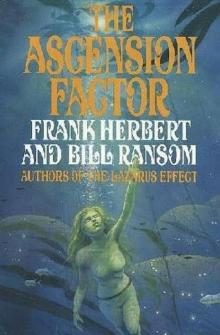 The Ascension Factor
The Ascension Factor The Heaven Makers
The Heaven Makers Children of Dune
Children of Dune Old Rambling House
Old Rambling House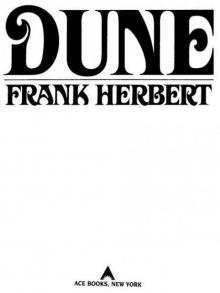 Dune
Dune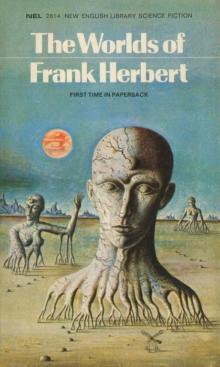 The Worlds of Frank Herbert
The Worlds of Frank Herbert The Jesus Incident
The Jesus Incident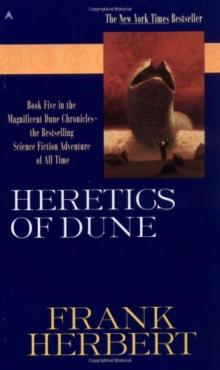 Heretics of Dune
Heretics of Dune Whipping Star
Whipping Star Dune Messiah
Dune Messiah Man of Two Worlds
Man of Two Worlds The Book of Frank Herbert
The Book of Frank Herbert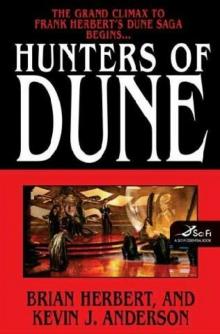 Hunters Of Dune
Hunters Of Dune The Tactful Saboteur
The Tactful Saboteur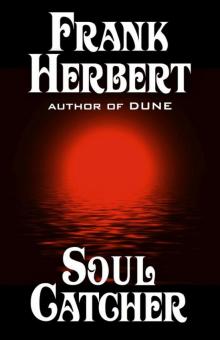 Soul Catcher
Soul Catcher God Emperor of Dune
God Emperor of Dune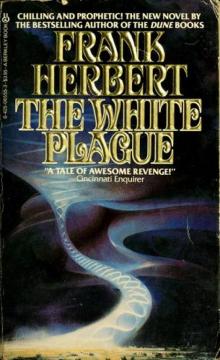 The White Plague
The White Plague The Green Brain
The Green Brain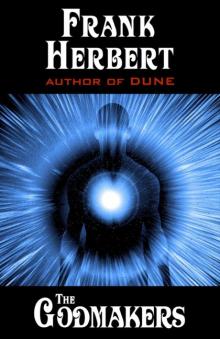 The Godmakers
The Godmakers Sandworms of Dune
Sandworms of Dune Destination Void
Destination Void The Dosadi Experiment
The Dosadi Experiment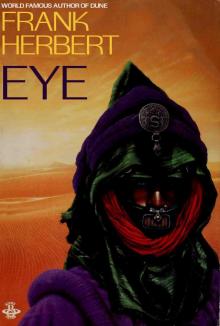 Eye
Eye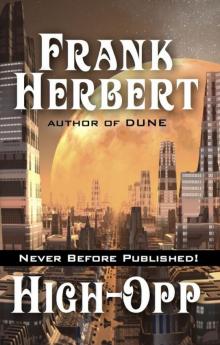 High-Opp
High-Opp The Eyes of Heisenberg
The Eyes of Heisenberg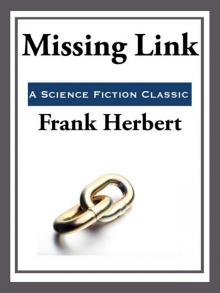 Missing Link
Missing Link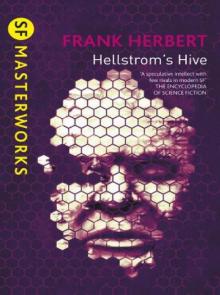 Hellstrom's Hive
Hellstrom's Hive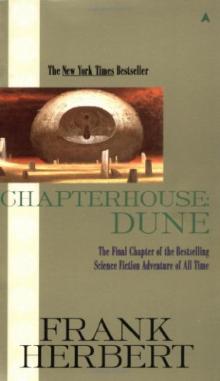 Chapterhouse: Dune
Chapterhouse: Dune The Santaroga Barrier
The Santaroga Barrier The Dragon in the Sea
The Dragon in the Sea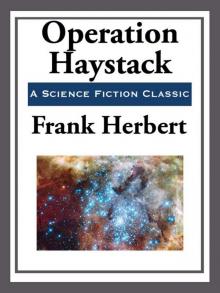 Operation Haystack
Operation Haystack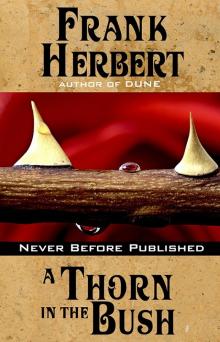 A Thorn in the Bush
A Thorn in the Bush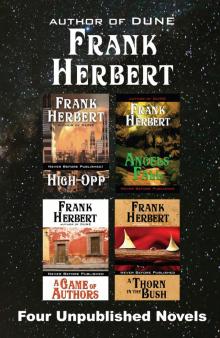 Four Unpublished Novels
Four Unpublished Novels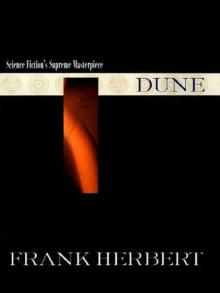 Dune dc-1
Dune dc-1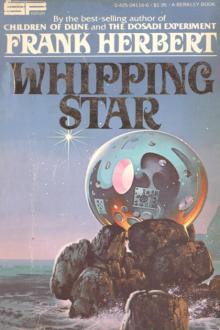 Jorj X. McKie 1 - Whipping Star
Jorj X. McKie 1 - Whipping Star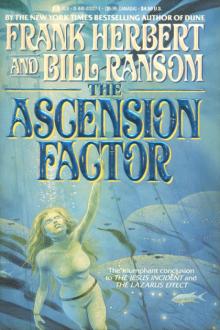 DV 4 - The Ascension Factor
DV 4 - The Ascension Factor Frank Herbert - Dune Book 4 - God Emperor Of Dune
Frank Herbert - Dune Book 4 - God Emperor Of Dune ChapterHouse: Dune dc-6
ChapterHouse: Dune dc-6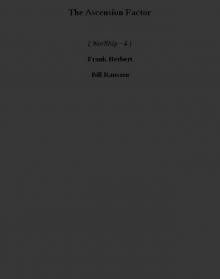 The Ascension Factor w-4
The Ascension Factor w-4 A Game of Authors
A Game of Authors Children of Dune dc-3
Children of Dune dc-3 Destination: Void: Prequel to the Pandora Sequence
Destination: Void: Prequel to the Pandora Sequence The Collected Stories of Frank Herbert
The Collected Stories of Frank Herbert Dune Messiah dc-2
Dune Messiah dc-2 Frank Herbert - Dune Book 5 - Heretics of Dune
Frank Herbert - Dune Book 5 - Heretics of Dune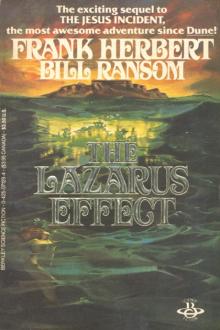 DV 3 - The Lazarus Effect
DV 3 - The Lazarus Effect The Jesus Incident w-2
The Jesus Incident w-2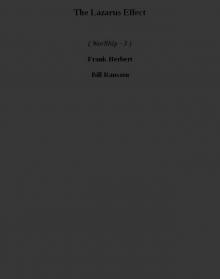 The Lazarus Effect w-3
The Lazarus Effect w-3 Frank Herbert
Frank Herbert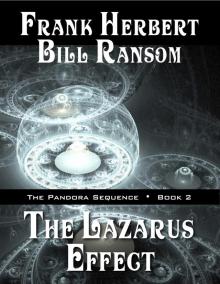 The Ascension Factor: Pandora Sequence
The Ascension Factor: Pandora Sequence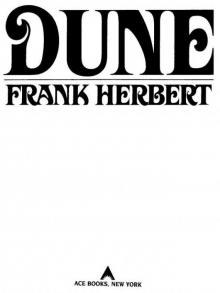 Dune (40th Anniversary Edition)
Dune (40th Anniversary Edition) The Dosadi Experiment c-2
The Dosadi Experiment c-2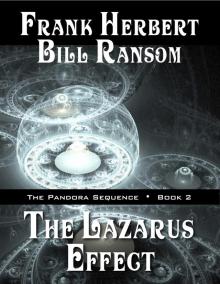 The Lazarus Effect
The Lazarus Effect God Emperor of Dune dc-4
God Emperor of Dune dc-4 The Pandora Sequence: The Jesus Incident, the Lazarus Effect, the Ascension Factor
The Pandora Sequence: The Jesus Incident, the Lazarus Effect, the Ascension Factor The Green Brain (v4.0)
The Green Brain (v4.0) The Heaven Makers (v4.0)
The Heaven Makers (v4.0) Heretics of Dune dc-5
Heretics of Dune dc-5